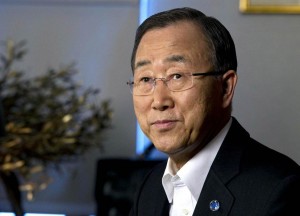By Tom Westcott

Tripoli, 12 September:
The United Nations secretary general, Ban Ki-moon, has said that he remains seriously concerned about the length . . .[restrict]of detentions and the treatment of detainees in the country.
In his latest report to the UN Security Council on the United Nations Support Mission in Libya (UNSMIL), Ban said: “I urge the country’s leadership to accelerate measures to deal with this issue.” In particular, he emphasised the need “to charge or release conflict-related detainees, so that no-one is held outside the framework of the law.”
According to the report, there are an estimated 7,000 detainees currently held across the country, most of whom have yet to be charged. Some 3,000 are held in facilities run by the Ministry of Justice and a further 2,600 detained by military councils or supreme security committees, institutions which are under some degree of state authority. However, nearly 1,500 are held by revolutionary brigades and these are most vulnerable to mistreatment.
“UNSMIL continues to impress upon the government that detaining persons outside a legal framework, in some cases for more than 10 months, is in serious breach of human rights standards,” said Ban.
UNSMIL has given the Ministry of Justice a strategy “to fulfil its responsibility to address conflict-related detentions and has provided training to prosecutors in screening detainees.”
Recognising that it will take time to implement a more systematic approach, UNSMIL is, in the meantime, coordinating a framework for international assistance to build the capacity of the country’s judicial system.
The report also noted that there continued to be reports of the torture of detainees. These include three instances of torture-related deaths in April at the facilities of the Supreme Security Committee of Misrata. Investigations by the Ministry of the Interior continue. As part of these investigations, the head of the Supreme Security Committee of Misrata was dismissed.
UNSMIL urges the Libyan authorities to address the issue of detainees as a matter on urgency. Action should include “robust inspections of known facilities, the identification and closure of unknown facilities and investigations into cases of torture.”
It was acknowledged that in some instances, the Ministry of the Interior and some Supreme Security Committees have conducted investigations and taken appropriate action. However, the report notes that “assurances from Libyan officials that incidents of torture or mistreatment would be investigated and perpetrators duly punished have not been translated into effective action.”
The UN head said that strong rule of law and institutions are essential to Libya’s future as a democracy. “The drafting of a new constitution represents an opportunity to ensure that the fundamental rights of individuals are both protected and enforced by strong State institutions,” he said.
Ban closed his report on a positive note, saying: “I commend the Libyan authorities and the Libyan people for their efforts in consolidating their democratic transition, in particular the historic elections of 7 July.” [/restrict]

